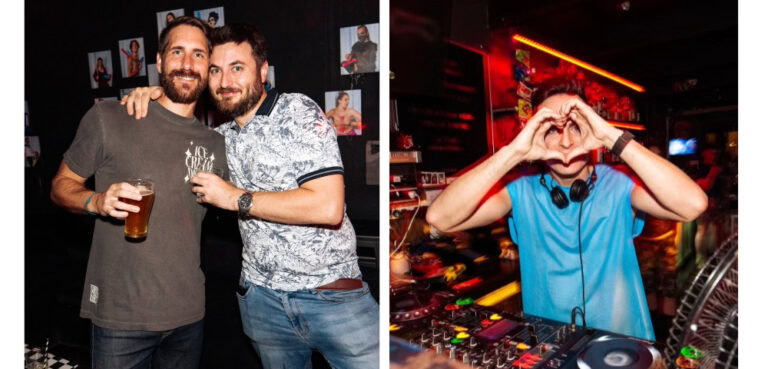
Sydney Festival Week 2
We thought it was bad lighting at first. The London Sinfonietta was introduced by composer Michael Berkeley, who seemed very strangely lit. There was a band of shadow across the gentleman’s forehead, which distracted from his introduction of the evening’s avant-garde program. Then I realised it was his hair -“ Berkeley had defiantly left a halo-like band across his mostly balding head, a Friar Tuck-inspired false fringe. I almost drifted off into hazy musings about the frequently eccentric coiffures of musos, when the band started playing.
They performed better than they looked, thankfully. In a night of extraordinary technical mastery, the Sinfonietta played a stunning program of contemporary classical music that included Introduction and Allegro by Ravel, Ritual Fragment by Birtwhistle and the Australian premiere of Berkeley’s own work, Entertaining Master Punch. As with last week’s Pasi?the work was dense and full of variety and utilised an extensive vocabulary of instruments and sounds. In the wind section, mutes were regularly snapped in and out, the percussionist scrambled from bells to drums and back again, and the violinists pitched everywhere from pp to Ligeti’s admittedly optimistic fffffff. Berkeley’s Entertaining Master Punch delicately blended bongos with strains of a classical court and a dash of Bernard Herrmann, as he captured Rudyard Kipling’s tortured youth. Takemitsu’s Tree Line didn’t quite out-Debussy Debussy as Berkeley claimed, but its lyricism and complexity proved haunting and was unfashionably devoted to a celebration of nature. It was also refreshing to see the orchestra perform at times without a conductor, an exercise in solidarity and skill that was thrilling to watch. The Sinfonietta’s only other Sydney Festival performance was on 11 January.
The Ron Mueck exhibition is packing them in at the Museum Of Contemporary Art, and with good reason. His staggering sculptures are disturbingly lifelike, and no doubt contribute to the enormous popularity of the work. (The level of craft is very high, with almost no my kid at preschool could have painted that factor.) So what makes it art? It’s the differences in scale -“ Mueck’s pregnant woman is almost 10 feet tall, and an old woman sleeping is less than a metre in length. It makes you gasp: the figures are both alien and utterly familiar, provoking horror and empathy. Madame Tussaud’s it ain’t.
Walking through Martin Place after 9pm proves almost as disconcerting, thanks to Craig Walsh’s zany installation Urban Tide. Enormous fish swim in the windows of the buildings of financial giants, in a Gilliam-esque colonisation that is glorious and simple. See it before 26 January, to get a glimpse of our globally warmed future.
Then it was goodbye Sydney, hello Parramatta, for Birth Of The Cool, a celebration of the Beat generation of writers and the jazz music that filled their lives. An earlier interview with actor John Turnbull promised that the event would be queer as fuck and by and large, we were not disappointed.
Even late in the season, it was terrific that celebrities made an effort to entertain journalists with their astonishing presence. In this instance, actors Sandy Gore and Deb (Not happy, Jan) Kennedy took their seats in row Z with my colleague and me (robbed of our row K seats thanks to a ticketing mix-up). Even up high though, the atmosphere was sharp, with candles, bottles of fake pills labelled Benzadrine: Fuel of the Cool and a guy at our table who looked spookily like Allan Ginsberg.
Birth Of The Cool was a mixed bag, man. The script was an intelligent blend of narration and Beat excerpts, with classics like Howl blended with sparkling observations from the Beat cats about each other. The musical accompaniment was slick, with homages to Charlie Bird Parker as well as moody background music that supported the spoken words of Turnbull. They even provided sound effects: the double bass became a 1950s atomic bomb air-raid siren and a bass clarinet doubled as a didgeridoo.
The homosexual content of the group’s experiences was more than adequately represented, and writers Camilla Rountree and Turnbull deserve high praise for presenting the group’s unashamed bad behaviour with appropriate shamelessness.
Unfortunately, there were a number of problems with the performance that proved annoying. When Turnbull grooved to the music it seemed unconvincing, and his demonstration of being cool immediately disqualified him from such status. His emulation of the vocal drawl of writers like Ginsberg backfired and resulted in a repetitive spoken song. Cool became coo-o-ool and America stretched to Amer-i-caaa. Yea-ahhh, this was irritating very early in the show.
There was also one truly disappointing moment: when Turnbull recited Ginsberg, the musicians gayed the music, and suddenly played in a fanciful, 1950s cocktail lounge style. The opportunity to prove that jazz music and homosexuality are not mutually exclusive was lost -“ Billy Strayhorn and Bessie Smith would be spinning at 78rpm in their graves.
And finally, a word of support for Neil Armfield and his battle with the estate of Samuel Beckett, who objected to Armfield’s inclusion of music in his Sydney Festival production of Waiting For Godot. There is a fine line between respecting the wishes of the playwright (dead or alive) and producing dull, museum-piece theatre. Armfield’s production is both faithful and original, and given that the Beckett estate has previously objected to an all-female production of Godot, shows that times have changed in ways that even Samuel Beckett might not have imagined. The best theatre shines with collaboration, of which the playwright (dead or alive) should be but one part. The alternative is that theatre practitioners are reduced to repeating the same banal patterns like a forgetful Estragon or a moribund Clov, and we truly have reached our endgame. More please, Mr Armfield.
Â
Birth Of The Cool continues tonight and Friday night at 8pm and then on Saturday 18 January at 6pm and 9pm. The Riverside Theatres are on corner of Church and Market Streets, Parramatta. For bookings phone 9266 4826.









